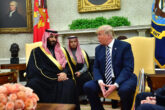October 19, 2020
Following Fresh US Sanctions, Will China Bail out Iran?
As the United States slapped additional sanctions on Iran on October 8, the Islamic Republic faces a grim financial future. The Iranian economy is already struggling, and the new designations would almost completely sever the country’s access to global capital. As U.S.-Iran relations deteriorate by the day, Iran has increasing economic and political motivation to lean into its strategic partnership with China.
Iran has increasing economic and political motivation to lean into its strategic partnership with China.
Iran’s economic motivations loom large given the dire circumstances. Since 2018, the United States has launched an aggressive pressure campaign on Iran. The most recent sanctions put a nail in the coffin, as they bring the remaining 18 Iranian banks that were not subject to secondary sanctions under this more aggressive pressure. Though Iran was already largely cut off from the international financial system for most trade, this in effect now completely severs Iran’s access to the U.S. dollar and basic consumer goods. While the sanctions carved out an exception for humanitarian transactions, international financial institutions such as those in Europe and developed Asia will also be hesitant to touch these transactions for fear of sanctions. Also, as Iran’s reserves dry up, the Central Bank of Iran will be even less able to defend the rial. On top of the country’s currency crisis, which is adding to inflationary pressures, economic vulnerabilities such as a rising current account deficit (including a large trade deficit with China) and fiscal deficit exert additional pressure on its already dwindling currency reserves.
Read the full article in The Diplomat.
More from CNAS
-
Transatlantic Security / Middle East Security / Energy, Economics & Security
Sanctions Aren’t Enough to Shut Down the Moscow-Tehran Black Market for WarThe geographic scope and extent of Iranian-Russian cooperation highlights the failure of traditional sanctions to prevent Moscow and Tehran from seeking key components like ch...
By Delaney Soliday
-
Game Over?
The trade wargame suggests that sustained high tariffs could create leverage and urgency to spur action toward a productive restructuring of the international trade system....
By Emily Kilcrease & Geoffrey Gertz
-
Middle East Security / Energy, Economics & Security
Trump Inks $600 Bn Deal In Saudi Arabia | Musk, Blackrock CEO Flank Trump In Gulf VisitIn today's episode of India Global, U.S. President Donald Trump secured a $600 billion commitment from Saudi Arabia on Tuesday to invest in the United States. NDTV's Gaurie Dw...
By Daniel Silverberg
-
Energy, Economics & Security / Technology & National Security
Tariffs and Tech: An Uncertain RecipeHigher tariffs could prompt American cloud companies to shift more of their capital investments abroad....
By Pablo Chavez




